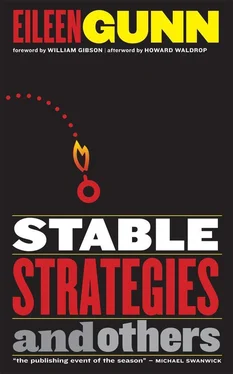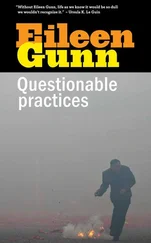Her people avoided the awkward, wingless visitors — their devices produced unnatural wave disturbances. Girat murmured a prayer against excessive vibration and glanced down at the camp.
There was only one visitor and it was lying motionless in the shadows, a victim, perhaps, of its own technology. Girat circled and descended, preparing to salvage its flesh for its relatives. She hoped she could do so without abandoning her early and well-deserved deathflight.
Odd that the preservation of their dead flesh was so important to the visitors. The past summer, Girat had observed them packing their dead in boxes and burying them for preservation. Perhaps they would eat them later. She found the thought repellent.
Girat was descending toward the visitor, only a few beats away, when suddenly it came alive and leaped to its feet, snatching a small object from the ground beside it. It held the object at arm’s length toward Girat, an action she recognized as an attempt to preserve the formality and distance that existed between her people and the visitors.
Well, that was certainly all right with her. With a sharp beat of her wings, Girat continued past, to resume her slow flight of dehydration. Since the visitor was not dead, she would not have to delay her dying on its account.
As she passed over the visitor, the object in its hand moved. Her right wing stung momentarily and went numb. Girat faltered in her flight, gave a jolting flap, and swung irregularly to the right, favoring the wounded wing.
Moving faster than she would have thought possible with a wing injury and in her moribund condition, Girat swooped toward the center of the empty city. She landed clumsily on an abandoned flight deck, bruising her numbed shoulder against a wall of masonry.
For a peaceful, pleasing death, she must die airborne, in a slow glide to the earth: she could fly no further until sensation returned to her wing. A maze of warrens and obelisks, its vibrations stilled, the City of Pillars would shelter her until she could resume flying. She settled her wounded limb carefully in place, then scuttled as quickly as she could down a deteriorating ramp.
The interruption was unexpected, but like any event on a deathflight, it must be accepted. A sentient creature like the visitor, however, ought to have more control over its actions. Her people were wise to avoid them, she thought. The miasmic resonance enveloping their camps would cripple anyone’s control.
At the foot of the spiraling inner ramp, strewn with ragged insulation and electronics torn from the walls, a broad irregular doorway led into a pillared square. Windswept detritus, wires and cables of synthetic substances, had piled up to the edge of the door. Girat stepped over the rubble and moved out into the open plaza.
Bozhye moi . The size of that bird. He knew he’d hit it with the trank gun, but he hadn’t brought it down. Damned dosage too low.
Alex Zamyatin watched the bird sail toward the center of the abandoned city. It was conscious, but the drug obviously was taking effect. The bird landed on a balcony a kilometer away. Good, he thought. It wouldn’t fall too far when it keeled over.
He shrugged on his copter pack and started after it. The city fell away beneath him — tall, slab-like buildings around tiled squares. Pyerva’s lighter gravity made it easier to get around, but without the copter, he’d have had a rough time in the roadless ruins.
Laid out in a series of open squares, vast empty plazas edged with towering obelisks, the city had obviously been the home of a people oriented to the air — and all the higher animals on Pyerva were winged. There were no streets below him and few connecting passages between the honeycomb of sandstone buildings and squares.
The balcony where the bird had landed was directly ahead. Alex was anxious to find the bird. It was his first chance, the expedition’s first chance, to examine a live specimen. They had dissected several dead birds found in the ruins, and had raised more questions than they had answered. What did the birds eat? Their intestines had contained no food at all. Where did they nest? Nowhere near the cities, that was certain; aerial reconnaissance had yielded no clues — no birds had even been sighted. How did they use those highly developed paws? Four fingers, two thumbs: they looked very efficient. And why did they die? In every case, dehydration had been the apparent cause of death. The wiry bodies were dried out, tongues shriveled, mucous membranes cracked. Perhaps they were gliding birds blown off course, away from their habitat, by strong winds.
Despite their large brains and opposable digits, there was no definite proof that they were at all intelligent. No artifacts or clothing. They didn’t inhabit the cities. And the initial planetary survey hadn’t revealed any other settlements.
And yet, they were the only possibility so far for intelligent life on this first extrasolar, life-harboring planet, Pyerva. The complexity of their nervous systems argued intelligence. And, structurally, they were the right creatures to live in these cities. Everything was built to the scale of these birds, alone of all the animals of Pyerva. Devices were engineered for their peculiar hands. If he were going to design a city for the birds to live in, Alex conceded, these were the cities he’d design. A live bird should end the speculation.
Alex landed on the balcony. It was pretty shaky — he ran into the building. They were familiar to him now, these alien structures. Door were staggered at various levels in the walls, designed for entrance from the air. Interior automated ramps, no longer operative, led down to the plaza level. He scanned the cluttered interior, furniture half or fully extruded from the walls and floor, the disorder of decaying technology. The bird was nowhere in sight. Alex ran down the ramp, checking quickly at each level. It would head for the plaza, he thought. Someplace open to the sky.
He found the bird collapsed in the square, not too far from the door. It lay near one of the pillars, its huge wings folded into fleshy carapace against its back. It was breathing shallowly, rapidly, its eyes covered with a whitish nictating membrane. Rate of metabolism and body temperature were even higher than he’d expected, but it would take a lot of energy to get that big a creature into the air. The bird was quasi-mammalian, as he had known: they were really more like bats than birds. Its long body was lightly muscled except for the powerful extensors that ran from beneath its wings, over its shoulders to the chest. It was covered with fine mauve down, a marsupial-like pouch on the abdomen. A female? Perhaps the term was irrelevant here.
He turned his cooling unit up another notch. Must be fifty degrees in the sun. The overheated air, despite its high oxygen content, was oppressive. Perhaps, Alex thought, it had been foolish of him to refuse an assistant: the stifling heat put an unexpected limit on his strength. But there were too few left on the expedition anyway, since the accident. He slid the tractor awkwardly under the animal’s body and rose into the air, pulling the unconscious bird with him.
It was beginning to revive as he got back to camp. He barely had time to get it into the collection cage and turn on the field. The great, downy creature stirred in the cage and opened its eyes. Large as a lemur’s, they shone a luminous violet, compelling his attention. The bird clambered to its feet, shook itself briefly, and flapped its wings to unfold them. Standing erect, it was easily two meters tall, knobby and angular, sharp bones emphasized by its loose skin, emaciation unsoftened by the sparse down.
Alex had the trank gun ready, just a blur dose in case it became violent enough to damage itself. The bird saw him and moved hesitantly in his direction, stopping when it saw the gun. Alex pointed it away from the creature: it seemed to relax. Did it recognize the gun? The bird approached him until it hit the invisible beams of the cage. Examining the force-field in front of it with its paws, it made a series of short, liquid noises. It explored, in silence, the extent of the cage, then turned back to Alex and approached him as closely as the cage would allow. Turning its hyacinth eyes on him, it said, in clear, unaccented Russian, “How do I get out?”
Читать дальше












